新版新目标英语八年级下册unit4知识点总结
春人教新目标英语八年级下册Unit4单元知识点总结全解
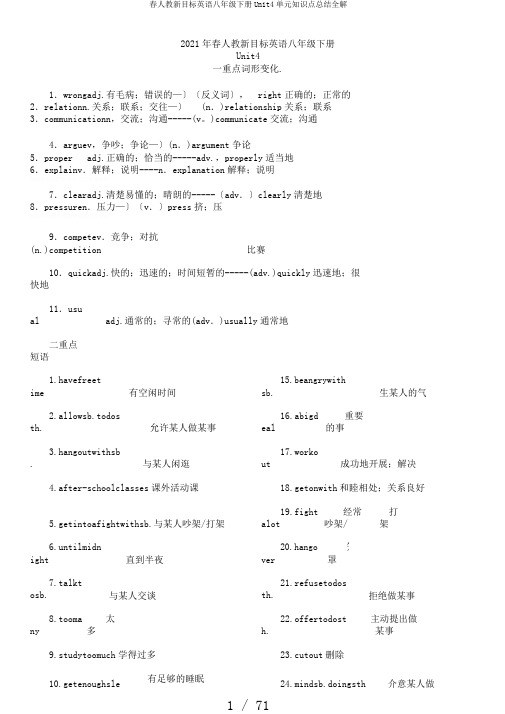
2021年春人教新目标英语八年级下册Unit4一重点词形变化.1.wrongadj.有毛病;错误的—〕〔反义词〕,right正确的;正常的2.relationn.关系;联系;交往—〕(n.)relationship关系;联系3.communicationn,交流;沟通-----(v。
)communicate交流;沟通4.arguev,争吵;争论—〕(n.)argument争论5.proper adj.正确的;恰当的-----adv.,properly适当地6.explainv.解释;说明----n.explanation解释;说明7.clearadj.清楚易懂的;晴朗的-----〔adv.〕clearly清楚地8.pressuren.压力—〕〔v.〕press挤;压9.competev.竞争;对抗(n.)competition比赛10.quickadj.快的;迅速的;时间短暂的-----(adv.)quickly迅速地;很快地11.usual adj.通常的;寻常的(adv.)usually通常地二重点短语1.havefreetime有空闲时间15.beangrywithsb.生某人的气2.allowsb.todosth.允许某人做某事16.abigdeal重要的事3.hangoutwithsb.与某人闲逛17.workout成功地开展;解决4.after-schoolclasses课外活动课18.getonwith和睦相处;关系良好5.getintoafightwithsb.与某人吵架/打架19.fightalot经常吵架/打架6.untilmidnight直到半夜20.hangover笼罩7.talktosb.与某人交谈21.refusetodosth.拒绝做某事8.tooma ny太多22.offertodosth.主动提出做某事9.studytoomuch学得过多23.cutout删除10.getenoughsle 有足够的睡眠24.mindsb.doingsth介意某人做ep.某事11.writesb.aletter给某人写信25municatewithsb.与某人交流12.callsb.up打给某人26.infuture今后13.surprisesb.令某人惊讶27.makesb.Angry使某人生气14.lookthrough浏览;翻看28.worryaboutsth.担忧某事29.copyone’shomework抄袭某人的作业36.freetimeactivities业余活动30.beoneself做自己37.getbettergrades取得更好的成绩31.familymembers家庭成员38.giveone’sopinion提出某人的观点32.spendtimealone单独消磨时光39.learnexamskills学习应试技巧33.givesb.pressure给某人施压40.practicesports体育训练34.haveafightwithsb.与某人吵架41.causestress造成压力35petewithsb.与某人竞争三重点句型:Myparentsdon’tallowmetohangoutwithmyfriends.我的父母不允许我和朋友一起闲逛。
新目标英语八年级下 Unit4重难点解析
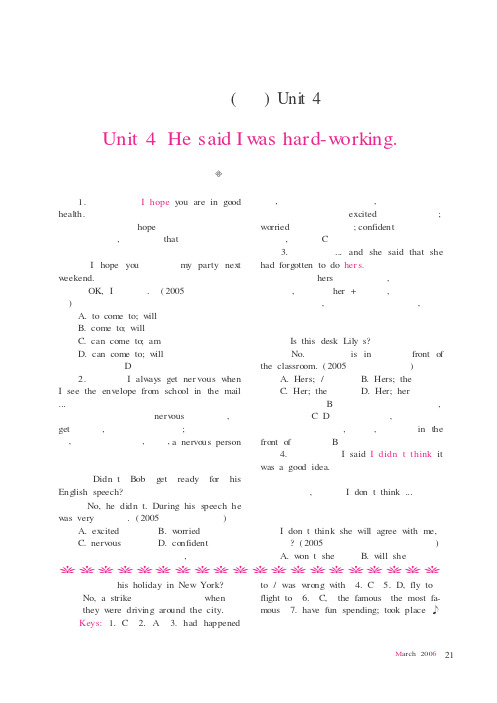
his holiday in New York0—No,a strike when they w ere driving aro und the city. Keys: 1.C 2.A 3.had happened to/was w ro ng w ith 4.C 5.D,fly to→flight to 6.C,the famous→the most fa-mous7.hav e fun spending G to ok place"1.【原句】I hope y ou are in go od health.【讲解】动词hope后可接动词不定式和从句。
注意,从句中的that通常省略。
【真题】—I hope yo u my party nex t w eekend.—OK,I.(2005辽宁省十一市)A.to come to M w ille to M willC.can co me to M amD.can come to M w ill【点拨】选D。
2.【原句】I alw ay s get ner vous w henI see the env elope fro m scho ol in the mail ...【讲解】本句中的nerv ous是形容词,作get的表语,意为“神精紧张的;不安的”。
另外,它也可以作定语,例如,a nervo us person 胆小的人。
【真题】—Didn’t Bob g et ready fo r his Eng lish speech0—No,he didn’t.During his speech he w as very.(2005山东省菏泽市)A.ex citedB.w orriedC.nerv ousD.co nfident【点拨】答语意为“是的,他没有准备好”,这是解题的第一关键,由此可推测出“演讲中他很紧张”。
excited意为“兴奋的”; wo rried意为“担忧的”;confident意为“有信心的”,答案为C。
八年级英语下册知识讲义-重点单词(Unit 4 )-人教新目标

初中英语重点单词(下册Unit 4 Why don’t you talk to your parents?)知识梳理allow v. 允许;准许wrong adj. 错误的;不对的guess v. 猜测;估计deal n. 协议;交易relation n. 关系;联系;交往communication n. 交流;沟通argue v. 争吵;争论cloud n. 云;云朵elder adj. 年纪较长的instead adv. 代替;反而;却whatever pron. 任何;每一nervous adj. 焦虑的;担忧的offer v. 主动提出;自愿给予proper adj. 正确地;恰当地secondly adv. 第二;其次communicate v. 交流;沟通copy v. 复制;复印return v. 回来;回去member n. 成员;分子pressure n. 压力compete v. 竞争;对抗opinion n. 意见;想法;看法skill n. 技艺;技巧typical adj. 典型的football n. 足球continue v. 持续;继续存在compare v. 比较crazy adj. 不理智的;疯狂的push v. 推动;移动development n. 发展;发育;成长cause n. 造成;引起usual adj. 通常的;寻常的perhaps adv. 可能;大概;也许二、重点单词【单词学习】1. allow v. 允许;准许【用法】(1)allow sb. to do sth. 允许某人做某事(2)allow (doing)sth. 允许(做)某事(3)be allowed to do sth. 是allow sb. to do sth.的被动结构,意为:被允许做某事。
【例句】His parents don’t allow him to go out at night. 他父母不允许他晚上出去。
英语人教版新目标八年级下册知识整理Unit4

【英语】八年级||下册教材全梳理(Unit4 He said I was hard -working )知识·巧学生词巧解【词析】音析:元音字母a读[].形析:形近词sad(忧愁的;悲哀的)义析:angry and crazy【典句】He was mad with joy.他欣喜假设狂.【拓展】固定搭配:be mad at/with =be angry with/at 生……的气【词析】音析:元音字母a发[e],ore在词尾读作[].形析:any(任何) +more(更多)义析:any longer,from now on【典句】He doesn ,t come here anymore.他再也不到这儿来了.【拓展】可构成not...anymore词组,也可写成no more .表达"不再〞的词组还有not...any longer/no longer,no more 和no longer用于句末.【辨析】not...anymore/no more与not...any longer/no longernot...anymore/no more指做某事次数不再增加,多与瞬间动词连用;not...any longer/no longer指时间上不再延续,多与持续性动词连用.first of all 首||先【词析】形析:first(第|一) +of +all(所有)义析:at first,the beginning【典句】First of all,you should think,and then speak.你应该先考虑,后开口.【拓展】first of all的同义词为at first,反义词为at last,in the end,finally等.【词析】音析:元音字母e发[e],a发[I].形析:mess(混乱) +age(年龄)义析:information,news sent to sb.in writing or speech【典句】Will you take this message to your brother?把这个便条捎给你哥哥好吗?【拓展】与message有关的词组有:give sb. a message 给……传个口信take a message for sb. 为……捎个口信leave a message 留言pass on 传递【词析】义析:take sth.to different places【典句】Let us now pass on to the next subject.现在让我们看看下一个题目.【拓展】后接宾语时可以构成pass on sth. to sb./pass on sb. sth.,当宾语为代词时只能用前一种.【词析】音析:重读开音节词,u读作[],元音字母o发本音[].形析:sup(超) +pose(姿态)义析:think about sth.that is not real now【典句】Let ,s suppose (that) the news is true.让我们假定这消息是真的 .【拓展】固定搭配:be supposed to被期望或被要求do well in 在……方面做得好【典句】I do well in drawing.我擅长画画.【拓展】be good at 相当于do well in,意思为"擅长……〞.be good at 的比较级||为be better at,do well in 的比较级||为do better in .be in good health 身体健康【词析】形析:be +in(在……状态下) +good(好的) +health(健康)义析:keep healthy,keep fit【典句】I hope you are in good health.我希望你身体健康.【拓展】表示身体健康的其他短语有:be healthy 健康的stay/keep healthy 保持健康【词析】形析:er读作[],ou读作[].形析:nerv(e)(神经的) + -ous(形容词后缀)义析:not relaxed,not comfortable【典句】I felt very nervous when I went into his office.当我走进他的办公室时,我感到很紧张.【拓展】固定搭配:be nervous about对……感到紧张【词析】音析:重读闭音节词,字母u读作[],i和y读作[I].形析:lucky(幸运的)变y为i + -ly(副词后缀)义析:fortunately【典句】Luckily,the police came right away.很幸运,警察马上就来了.【拓展】1)同根词:luck n.运气;lucky adj.幸运的2)反义词:unluckily【词析】音析:元音字母u读作[],词尾的e不发音.形析:形近词blue(蓝色)义析:right,not against【典句】Is it true that you are rich?你很富有是真的吗?【拓展】同根词:truth n.真理;truly adv.真实地【词析】音析:ow读作[].形析:形近词town(城镇)义析:belong to oneself【典句】She makes her own clothes.她自己做衣服.【拓展】own作为形容词意为"自己的〞,常用在表示所有格的词后起强调作用.作为动词意为"拥有〞,名词为owner(主人) .轻轻告诉你Every heart has its own sorrow.各人有各人的苦恼.get over 克服;恢复;原谅【词析】形析:get(得到) +over(在上面)义析:recover,forgive sb.【典句】Can we get over this difficulty?我们能克服这个困难吗?【拓展】与get有关的词组有:get to 到达get on 上车get off 下车get ready for 为……作准备get up 起床【词析】音析:第|一个a读作[],第二个a读作[I] .义析:person who finish the study in a college【典句】Two thirds of the graduates find jobs.三分之二的毕业生找到了工作.【拓展】作为动词意为"毕业〞可构成graduate from "毕业于……〞.【词析】音析:闭音节词,字母i读作\I\] .形析:形近词than(比)义析:not dense or concentrated【典句】The air there is very thin.那里的空气很稀薄.【拓展】作"稀薄的〞讲时反义词为thick,作"瘦的〞讲时反义词为fat .【词析】音析:字母e和i均读作[I],sion读作[].形析:deci(de)(决定) +sion(名词后缀)义析:something you must make a choice at one time【典句】She could not make a decision about the dresses.她对(买不买)这衣服下不了决心.【拓展】make a decision to do sth. =decide to do sth.(决定做某事)【词析】音析:ar读作[].形析:star(星星) +t义析:begin【典句】If you are ready,you may start your work.如果你准备好了,你可以开始工作了.【拓展】start作为动词"开始〞时与begin同义,其后可接动名词或动词不定式.【辨析】begin与start一般情况下,这两个词都可接动名词或动词不定式,二者用法相同.以下两种情况下只能用start,而不用begin .1)当机器"开动、发动〞时.2)作为"旅途〞开始时.care for 照顾,照料【词析】形析:care(关心) +for(为了……)义析:take care of,look after【典句】The boy is too young to care for himself.这个男孩太小,不能照顾自己.【词析】音析:元音字母a发本音[eI],字母组合er发[].形析:d +anger (愤怒)义析:risk;a source or an instance of risk or peril【典句】In war,life is full of danger for everyone.在战争中,每个人的生活都充满了危险.【拓展】1)与danger有关的词组有:in danger 在危险中out of danger 出险;脱险2)danger的形容词形式:dangerous例句精讲Section ALana thinks she ,s coming to my house to study.拉娜以为她要到我家来学习.【巧解句构】这是一个含有宾语从句的主从复合句,主句为一般现在时态,从句是用趋向性动词come的现在分词表将来.【拓展延伸】宾语从句的时态必须与主句照应:当主句中谓语是现在或将来时态,从句谓语不受主句谓语时态的影响,可以按需要使用任何时态,例如:She says that she has never been to Mount Tai.1)当主句谓语为过去时态,从句中的时态一般为过去的某种时态.例如:He said he had finished his homework.2)当从句表达的是某一客观真理(事实)时,主句无论是何种时态,从句那么用一般现在时.例如:He said that light travels much faster than sound.误区警示假设宾语从句跟在动词think,believe,suppose,expect等表示"要,认为〞等的动词后时,句子的否认表达在主句上,这就是"否认转移〞现象.例如:I don ,t think you are right.我认为你不正确.I don ,t believe he has finished his work.我相信他还没有完成他的工作.Section B 3a1.I was sorry to hear that he had a cold last week.我听说他上周感冒了觉得很难过.【巧解句构】这是一句包含宾语从句的主从复合句.主句是过去时态,从句也用过去时态.本句中that变为了宾语从句he had a cold last week的引导词.【要点剖析】I was sorry to hear that...是表示遗憾的常用语,意为"我听到……很遗憾〞.have a cold意为"患感冒〞还可以写成catch a cold .类似的词组还有:have a cough 咳嗽have a fever 发烧have a headache 头疼2.I had a really hard time with science this semester,and I wasn ,t surprised to find that my worst report was from my science(科学)teacher.这学期我的科学课学得确实很吃力,所以当我看到最||糟糕的评价来自于科学课老师时,我毫不吃惊.【巧解句构】这是一句由and连接的并列句.前一个分句是简单句,后一个分句是包含宾语从句的主从复合句,主句I wasn ,t surprised to find "我毫不吃惊地发现……〞,不定式的动词find后面带一个由that引导的宾语从句.【要点剖析】词组have a hard time with sth.意为"应付某事很费力〞;be surprised to意为"对……感到吃惊〞,不定式后接动词的原形.surprised为形容词,surprise为名词构成to one ,s surprise(使……惊奇的是)词组.【辨析比较】surprised 和surprising1)当人作主语或修饰与人有关的词时用以ed结尾的形容词.2)当物作主语或修饰与物有关的词时用以ing结尾的形容词.例如:We are surprised to hear the surprising news.我们听到那条令人惊讶的新闻感到非常吃惊.3.The good news is that my math teacher said I was hard -working.好消息是数学老师说我很用功 .【巧解句构】这是一句包含表语从句的主从复合句 .主句the good news is使用的是一般现在时,表示目前的情况.由that引导的从句my math teacher said I was hard working在句中充当表语,使用的是一般过去时,陈述过去.其中又包含一个从句I was hard working,作said的宾语.【拓展延伸】表语从句于主句中的系动词之后,主要有四类:1)由连词who,what,which 等引导的表语从句.这些词不但可以起连接作用,还可以在句中作主语、宾语和表语.例如:China is not what she was yesterday.中|国已不再是以前的那个中|国了.2)由不充当任何句子成分的连词that,whether引起的表语从句.例如:What I mean is that we should help each other.我的意思是我们应该互相帮助.The problem is whether we can finish the work on time.问题是我们能不能按时完成工作.3)由连接副词when,where,why,how 引导的表语从句 .例如:This is when I really get to know Americans.我这时才开始认识美|国人.4)由连词as,because,as if,as though 引导的表语从句.例如:It looks as if it is going to rain tonight.看起来好似今晚要下雨.Self Check 2Last week in school we had a big fight,and she didn ,t talk to me.上周在学校我们大吵了一架,她不和我说话了 .【巧解句构】这是一个and连接的前后均是一般过去时态的并列句.【要点剖析】1)短语have a fight意为"吵架〞,后面接宾语时要加上介词with,即have a fight with等同于fight with sb.(此时的fight为动词) .2)短语talk to sb.意为"与……谈话/交谈〞,to也可以被with替换 .如果talk后面接的是"某事〞那么介词用about即talk about sth. .She said helping others changed her life.1.Teaching high school students in a poor mountain village in Gansu Province may not sound like fun to you.在甘肃省一个贫困山村教中学生,在你听来也许并不有趣 .【巧解句构】该句是个简单句.这句话的主语很长,一个动名词短语(teaching high school students "教中学生〞)加上两个地点状语(in a poor mountain village "贫困山村〞和in Gansu Province "甘肃省〞)构成了本句的主语.谓语局部那么使用了sound like短语,表示"听来并不有趣〞.【要点剖析】短语sound like 意为"听起来像……〞,sound是一个系动词,类似的词还有:feel,smell,taste,look,get,turn等.2.She said that both she and her husband thought this was a good idea.她和她丈夫都认为这是一件很好的事.【巧解句构】该句是个复合句,said后面的that引导的是宾语从句,是said的内容;句中的thought后面也是一个宾语从句,但省略了引导词that .通常宾语从句由that引导时,常可省去that,但said后的that常保存.【要点剖析】词组both...and...意为"(两者)都〞是并列连词可以连接两个人或物一起作主语.反义词为neither...nor...,它们的用法不同:neither...nor...引导的词作主语时谓语动词与nor 后的词保持一致即就近原那么;both...and...无此用法 .3.There is no difference between you and them.你和他们之间没有不同.【巧解句构】该句是一个there be句型,名词difference作句子的真正主语,no相当于not any .There is no difference between...and...意为"在……和……之间没有区别〞 .如果表示"有区别〞,那么使用There is a difference between...and...或者There are differencesbetween...and... .【要点剖析】词组between...and...表示"在……之间〞,between只用于二者之间.【拓展延伸】there be句型的一些用法:1)主谓一致谓语动词要采取就近一致原那么,和靠近be的主语一致.例如:There is a pen,two rulers in the box.盒子里有一只钢笔,两把尺子.There are two boys and a teacher at the school gate.门口有两个男孩,一个老师.2)主语后的动词形式在there be 句型中,主语与动词是主动关系时用现在分词;是被动关系时用过去分词.例如: There is a purse lying on the ground.地上有一个钱包.There are five minutes left now.现在还有5分钟.3)反意疑问句反意疑问句应与there be对应,而不是依据主语.例如:There is a radio on the table,isn ,t there?桌子上有一台收音机,是吧?There are more than fifty classes in your school,aren ,t there?你们学校有50个班,是吧?4)there be 与have的替换there be表示所属时可与have替换.There is nothing but a book in my bag. =I have nothing but a book in my bag.在我包里只有一本书.记忆要诀there be 句型的谓语歌诀there be句型可译"有〞,be 动词跟着名词走.名词单数不可数,当用is记清楚.如果名词是复数,用are一定要记住.出现并列主语特殊记, "就近原那么〞用仔细.4.I can open up my students , eyes to the outside world and give them a good start in life.我能为我的学生翻开眼界看外面的世|界,并且给他们的生活一个好的开始 .【巧解句构】该句是一个含有情态动词的一般现在时态的简单句,and连接前后两个并列谓语.【要点剖析】1)短语open up one ,s eyes 意为"使……开眼界〞.2)动词give有两种用法:give sb. sth.和give sth. to sb. .5.When her year was over,she said that she would return to the area after finishing her studies.一年期满时她说:毕业后她会回到这个地方.【巧解句构】该句是个包含时间状语从句和宾语从句的主从复合句.时间状语从句when her year was over意为"当她的一年(支教)期结束时……〞.主句是一个间接引语,that...studies作said的宾语从句,时态为过去将来时,说明是在"当时〞要离开的时候,杨蕾承诺"将来〞要回到这个地方;在这个宾语从句中after finishing her studies作为一个时间状语,点明了她将要回来的时间为"完成学业后〞.【要点剖析】1)短语be over意为"结束〞.2)return to...意为"返回……〞.语法解读直接引语和间接引语引述或转述别人的话称为"引语〞.直接引用别人的原话,两边用引号"〞标出,叫做直接引语;用自己的语言转述别人的话,不需要引号,叫做间接引语,实际上间接引语大都是宾语从句,其中由祈使句转换的间接引语除外,其转换后是不定式.那么直接引语为陈述句、一般疑问句、特殊疑问句和祈使句,转换为间接引语时,句子的结构,人称、时态、时间状语和地点状语等都要有变化,如何变化呢?一、人称的转变下面有一句顺口溜"一随主,二随宾,第三人称不更新〞可以帮助我们记忆."一随主〞是指在直接引语变间接引语时,如果从句中的主语是第|一人称或被第|一人称所修饰,从句中的人称要按照主句中主语的人称变化.例如:He said, "I am very happy.〞He said that he was very happy."二随宾〞是指直接引语变间接引语时,假设从句中的主语及宾语是第二人称或被第二人称所修饰,从句中的人称要跟引号外的主句的宾语一致.如果引号外的主句没有宾语,也可以用第|一人称,例如:She said to her son, "I ,ll check your homework tonight.〞She said to her son that she would check his homework that night."You should be more careful next time,〞my grandfather said.My grandfather said that I should be more careful the next time."第三人称不更新〞是指直接引语变间接引语时,如果从句中的主语及宾语是第三人称或被第三人称所修饰,从句中的人称一般不需要变化.例如:Mr.Smith said, "Jack is a good student.〞→ Mr.Smith said Jack was a good student.总之,人称的转换不是固定的,具体情况、具体对待,要符合逻辑.二、时态的转换直接引语改为间接引语时,主句中的谓语动词如果是过去时,从句(即间接引语局部)的谓语动词在时态方面要作相应的变化,变成过去时范畴的各种时态(实际也是宾语从句的时态要求),变化如下:一般现在时→一般过去时现在进行时→过去进行时现在完成时→过去完成时一般将来时→过去将来时一般过去时→过去完成时过去完成时→不变过去进行时→不变例如:1. "I am very glad to visit the Great Wall ,〞she said.→She said she was very glad to visit the Great Wall.2.Jim said, "We are listening to the music.〞→Jim said that they were listening to the music.3.Mother asked, "Have you finished your homework before nine o ,clock?〞→Mother asked me whether I had finished my homework before nine o ,clock.4.He asked the policeman, "Where shall I find the nearest bookshop?〞→He asked the policeman where he would find the nearest bookshop.5. "Why did she go there?〞the teacher asked.→The teacher asked why she had gone there.6.Mother asked me, "Had you finished your homework before supper?〞→Mother asked me whether I had finished my homework before supper.7.Tom said, "We were having a football match this time yesterday.〞→Tom said that they were having a football match that time the day before.三、结构的转换1.陈述句.用连词that引导,that在口语中常省略.主句的谓语动词可用直接引语中的said,也可用told来代替,注意,可以说said that,said to sb. that,told sb. that,不可直接说told that .例如:He said, "I have been to the West Lake.〞He said to us that he had been to the West Lake.He said, "I ,ll give you an exam next week.〞He told us that he would give us an exam the next week.(不可说told that)此外主句中的谓语还常用repeat,answer,reply,explain,think等.例如:He said, "I ,m late because of the heavy snow.〞He explained to us that he was late because of the heavy snow.2.直接引语为一般疑问句,也称是否疑问句,间接引语用连词whether或if引导,原主句中谓语动词said要改为asked(me/him/us等),语序是陈述句的语序,这一点非常重要.例如:He said, "Do you have any difficulty with this work?〞He asked (me) whether/if I had any difficulty with this work.3.直接引语为特殊疑问句,改成间接引语时,原来的疑问词作为间接引语的连词,主句的谓语动词用ask(sb.)来表达,语序改为陈述句语序.例如:He asked me, "How many classrooms have been built in your school?〞He asked me how many classrooms had been built in our school.4.直接引语为祈使句时,改为间接引语,用带to的不定式表达,谓语动词常是ask,advise,tell,warn,order,request等.如ask sb.to do,(由肯定祈使句变成)ask sb.not to do(由否认祈使句转变),并且在不定式短语中的时间状语、地点状语、人称及时态都作相应的变化.例如:He said, "Be quiet,please.〞He asked us to be quiet."Don ,t touch anything in the lab,〞the teacher said.The teacher warned the students not to touch anything in the lab.四、时间状语和地点状语的转换在直接引语中在间接引语中指示代词this thatthose表示时间的词now thenthat daythat week(month,etc.)the day beforethe week(month,etc.)beforethree days (a year ,etc.)beforethe next (following) daythe next (following)week (month,etc.)表地点的词动词there take go但要注意在以下几种情况,直接引语变为间接引语时,时态一般不变化:1.直接引语是客观真理."The earth moves around the sun ,〞the teacher told me.→The teacher told me the earth moves around the sun.2.直接引语如果是一般现在时,表示一种反复出现或习惯性的动作.例如:He said, "I get up at seven every morning.〞→He said he gets up at seven every morning.3.如果直接引语中的情态动词没有过去时的形式(例如:had better,used to)和已经是过去时的形式时,(例如:could,should,would,might)不再变.例如:Peter said, "You had better come have today.〞→Peter said I had better go there that day.听说速递1.表达观点I think you are...我想你是……I think you are right.Thank you.I think you are good at English.I think you are lazy.I think you are hard working.2.表达问候How ,s it going?一切都顺利吗?Does everything go well?Is everything going well?How are you?Fine,thanks.Best wishes to you.3.表达遗憾I ,m sorry to hear that...我听到……很遗憾.What a pity!I ,m sorry.It ,s unfair for you.4.表达希望I hope that...我希望……I hope that you are better now.I hope you are happy.Have a good time!Have a good trip.读写指导如何写好限制性作文【点石成金】1.仔细审题,明确要求.对题目所提供的信息要认真分析,明确要求,做到心中有数.要对所提供的信息加以分析、整理,使之更加具体化、条理化,为开始动笔作好前期准备工作.还要搞清这那么题目的要求是写短文、日记、信件还是便条等,以便根据不同的题材、体裁,写出不同格式、风格各异的文章.此外,也应注意所要求的人称、时间、地点、人物等信息,防止用错.2.抓住重点,寻求思路.根据题目所提供的信息,草拟一个提纲,寻求逻辑次序,确定从何下手,再围绕这一次序,周密选词、选句,以便更加贴近主题;否那么,语无伦次的文章将不会被人接受.3.用词恰当,表达流畅.在写作过程中,万一哪个词想不起来了,千万不能空着或不写,最||好找一个同义词或用其同义句、同义词组(短语)代替.表达中不写没有把握的句子,尽可能用自己熟悉的词和句子来表达意思.表达中,尽可能采用一些简单句,并使前后句、上下文过渡自然.正确使用and,or,but,because,so等词以便使行文自然流畅,使人读后不至||于有"死水一潭〞之感觉.还应注意各种时态、语态和各种句式的交替使用,使文章显得得体、大方、错落有致.4.成文之后全面检查全文.着重看是否存在以下问题:格式、拼写、标点、扣题、不标准英文、时态、语态、主谓一致、冠词、介词、单复数、比较级||别、顺序、大小写、代词等用法错误或使用不当.【常用词汇】ever,mad,anymore,pass on,suppose,do well in,in good health,nervous,worst,lucky,hers,own,get over,meter,ate,decision,open up,start,care for,danger 【常用句型】1)What did...say?……说什么了?2)He said I could...他说我能……3)He told me he would...他告诉我他将……4)Mary said she would...玛丽说她将……5)I think you are... 我想你是……6)How ,s it going?一切都顺利吗?7)I ,m sorry to hear that... 我听到……很遗憾.8)I hope that... 我希望……9)Really?You ,re lucky.真的?你真幸运 .典题·热题例1 (2021福建福州模拟) -Do you know _________?-She came by bus.A.when she got to schoolB.why she was late for classC.how she came to school this morningD.how many times she was late for class思路解析:此题考查宾语从句的用法.主句为一般现在时态,从句可以根据表达的需要选择任何时态.根据答语可知,从句应用一般过去时态.由"by bus〞可知,对于交通工具提问只能用"how〞.答案:C误区警示此题有两处误区:一是时态,主句为一般现在时态,从句往往会误用一般现在时态;二是语序,忽略宾语从句需用陈述句语序.例2 (2021浙江杭州模拟) -Why didn ,t Alice come to the party last night?-I don ,t know _________.A.why didn ,t sheB.why she didn ,tC.why did sheD.why she did思路解析:宾语从句应用陈述句语序,故A、C项错,由题意可知,是"我不知道她为什么不来〞应用否认句,故D项错.答案:B例3 (2021湖北黄冈模拟) -Can you see ___________?-No,let ,s go and have a look.Maybe we can help them.A.what was happening thereB.what are they doing thereC.what are they talking aboutD.what is happening there思路解析:此题考查的是宾语从句的用法.当问及"你能看见……〞时,可知事情正在进行,因此应该用现在进行时态,故A不对.宾语从句应按陈述句语序排列,故B、C两项不对.D项中的what作主语,故D项是正确的.答案:D例4 (2021南通模拟) When you are sleeping,you had better _______ all your windows closed.,t keep B.not keepC.not to keepD.not keeping思路解析:此题考查had better的用法 .had better无论是用在肯定句还是在否认句中,后面都只能接动词原形.因此,C、D项均错.而had better的否认形式为had better not,故A错.答案:B误区警示better为形容词good和副词well的比较级||,这使人常常会想起"be +adj. +to do〞这种结构,会误以为had better to do sth.是正确搭配,从而错选C项 .深化升华记牢"had better(not) +动词原形〞这种结构.例5 (2021南京模拟)Susan is always the best in different exams in our class because she is a ___________ girl.-working思路解析:此题考查词的用法.此句意为"苏珊在我们班的不同的考试中总是最||好的〞,而helpful意为"有帮助的〞,polite意为"有礼貌的〞proud意为"自豪的〞,hard -working意为"努力的〞,只有hard -working与题意相符.答案:D误区警示多数形容词都可作定语修饰名词,如果不能理解词义,很容易出现误选.深化升华多动口,多动手,勤读读,多练练,掌握词的音、形、义就一路畅通了.例6 完形填空(2021河北模拟)Big schoolbags have been a serious problem for students for a long time.Maybe your schoolbags is too 1 to carry,and it troubles you a lot 2 you want to find a book out to read.Now an e -textbook will 3 you.It is said that e -textbooks are going to be 4in Chinese middle schools.An e -textbook,in fact,is a small 5 for students.It is much 6 than a usual schoolbag and easy to carry.Though it is as small as a book,it can 7all the materials(材料) for study.The students can read the text page by page on the 8,take notes with the pointer(屏写笔),or even "9〞their homework to their teachers by sending e mails.All they have to do is to press a button.Some people say e -textbooks are good,but some say they may be 10for thestudents , eyes.What do you think of it?D.understandD.practice9.A.find out B.hand inC.get backD.give back思路分析:此题为完形填空题,是模拟必考题之一也是一道综合题.应从四方面入手:1.认真阅读短文,从句意词义入手,选择适当的词填空.2.从词的用法入手,看考查的是哪个词,它有什么用法.3.从固定搭配入手,包括介词的用法.4.从时态入手,根据时态的不同选用不同的动词形式 .在正确理解句意的前提下,抓住关键句,找到突破口.运用学过的词,词组或语法对空下"药〞.希望能在不断的练习中提高自己的综合语言运用能力,提高自身的素质.答案:1~5 BDCAD6~10 BACBD深化升华1.由"Big schoolbags have been a serious problem for students for a long time.〞可以判断出.2.由句意可知此句为"当你想找出一本书来读时,他会麻烦很多〞因此只能由when来引导时间状语从句.3.由句意可知"现在一本e -textbook将帮助你〞.4.比照各选项的词义可判断出,这里指"被使用〞.5.通读全文我们可以知道既可以用屏写笔在上写也可以读,可以判断出只能是台电脑.6.因为本文是对学生们的书包越来越重深表担忧,因此e textbook肯定更轻,因此lighter 符合题意.意为"保持,保存〞,build意为"建筑,建造〞,discover意为"发现〞,practice意为"练习,实践〞.根据词义只有hold符合题意.8.这是一种电子书因此只能有screen(荧屏) .9.根据选项的词义以及句意只有hand in(上交)与作业有关.表转折,因此前面说好(good)后面一定与此相反(bad) .例7任务型阅读(2021福建福州模拟)。
人教版新目标英语八年级下册英语unit4重点短语和句子分析
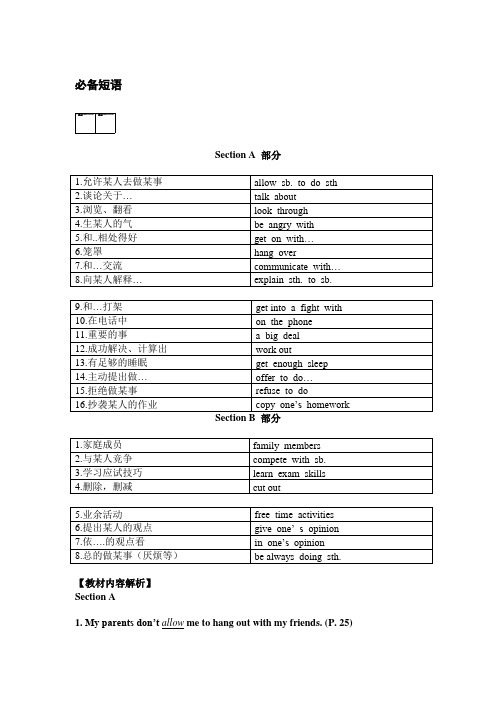
必备短语Section A 部分【教材内容解析】Section A1. My parents don’t allow me to hang out with my friends. (P. 25)① allow doing sth. 允许做某事翻译:The shopkeeper (店员) doesn’t allow smoking in any corner of the shop.__________________________________________② allow sb. to do sth. 允许某人做某事翻译:His parents allow him to play computer games if he finishes his homework. ____________________________________________2. I got into a fight with my best friend. (P. 25)get into a fight with sb.意为“和某人打架”,相当于have a fight with sb.或者fight with sb.。
翻译:He got drunk (醉酒的) and got into a fight with Jim._________________________________________3. What’s wrong? (P. 25)What’s wrong?意为“怎么了?”,用来询问对方有什么问题或者不顺心的事,What’s wrong with...?意为“……怎么了?”,后接sb.或者sth.,用来询问某人或者某物怎么了?---What’s wrong with you, Jim?---I left my umbrella on the bus.【拓展】询问“怎么了?”,主要有以下几种句型:What’s wrong (with sb./sth.)?What’s the matter (with sb./sth.)?What’s the trouble (with sb./sth.)?What’s up (with sb./sth.)?4. I’m really tired because I studied until midnight last night. (P. 25)until表示“直到”和延续性动词连用,意为一个动作一直持续到某个点为止;同短暂性行动连用时,用于“not...until”结构中,表示“直到……才……”。
新版新目标八年级下册英语Unit4_词组
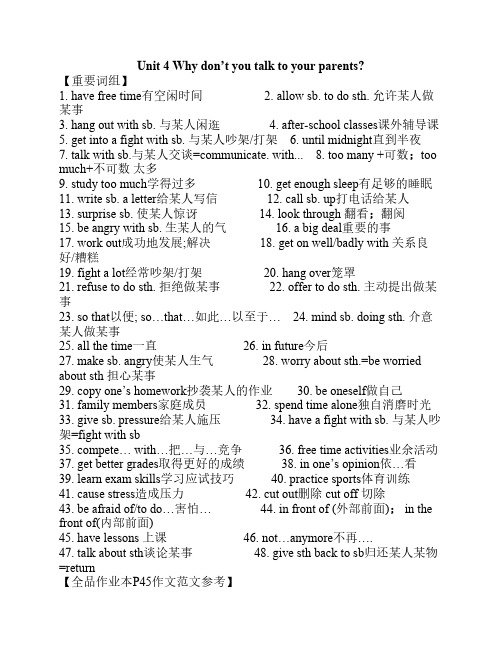
Unit 4 Why don’t you talk to your parents?【重要词组】1. have free time有空闲时间2. allow sb. to do sth. 允许某人做某事3. hang out with sb. 与某人闲逛4. after-school classes课外辅导课5. get into a fight with sb. 与某人吵架/打架6. until midnight直到半夜7. talk with sb.与某人交谈=communicate. with...8. too many +可数;too much+不可数太多9. study too much学得过多 10. get enough sleep有足够的睡眠11. write sb. a letter给某人写信 12. call sb. up打电话给某人13. surprise sb. 使某人惊讶 14. look through 翻看;翻阅15. be angry with sb. 生某人的气 16. a big deal重要的事17. work out成功地发展;解决 18. get on well/badly with 关系良好/糟糕19. fight a lot经常吵架/打架 20. hang over笼罩21. refuse to do sth. 拒绝做某事 22. offer to do sth. 主动提出做某事23. so that以便; so…that…如此…以至于… 24. mind sb. doing sth. 介意某人做某事25. all the time一直 26. in future今后27. make sb. angry使某人生气 28. worry about sth.=be worried about sth 担心某事29. copy one’s homework抄袭某人的作业 30. be oneself做自己31. family members家庭成员 32. spend time alone独自消磨时光33. give sb. pressure给某人施压 34. have a fight with sb. 与某人吵架=fight with sb35. compete… with…把…与…竞争 36. free time activities业余活动37. get better grades取得更好的成绩 38. in one’s opinion依…看39. learn exam skills学习应试技巧 40. practice sports体育训练41. cause stress造成压力 42. cut out删除 cut off 切除43. be afraid of/to do…害怕… 44. in front of (外部前面); in the front of(内部前面)45. have lessons 上课 46. not…anymore不再….47. talk about sth谈论某事 48. give sth back to sb归还某人某物=return【全品作业本P45作文范文参考】Dear Jane,I’m sorry to have a fight with you a few days ago.We haven’t talked with each other these days. You are still my best friend, aren’t you?Some days ago, when I heard that you lost my book, I was really mad. So I argued with you, and said that I could not be your best friend from then on. Later, I didn’t sleep well at night. I always remembered a lot of fun we had. So I decide to write a letter to say sorry to you. I also think you should be careful and take good care of your things. Let’s be best friends again, OK?Yours,Julia 【全品作业本P48作文范文参考】Dear Alice,I’m sorry to hear that you are not very well and feel unhappy. Here is my advice about how to keep healthy. A balanced diet can help you be in good health. You’d better eat more healthy food. It’s good for you to eat a lot of vegetables, fruit and drink milk every day. And you should do more exercise, such as playing ball games, running, swimming and so on. You also need enough sleep; it’s really important. What’s more(还有), keep yourself happy. Try to smile every day. I hope you will be better and enjoy your life.Yours,Martin 【课本P32 3b作文范文参考】Dear Sir or Madam,I don’t really agree with the opinion that children should take after-school classes, because children have to work hard at school and actually(事实上) they have taken enough stress. Although some parents are right about the ideas to make their children successful, I think children should be respected(尊重) and they have their own interests and hobbies.In my opinion, it is important for parents to talk with their children about whether(是否) they are willing to(愿意) take after-school classes. I believe it is better if parents show their respect to their kids so that there will be a good result. Perhaps communication between parents and children is useful both for parents and children.Yours truly,Wang Xiang。
新目标英语 八年级下册 Unit 4 重点知识归纳

Unit 4 Why don’t you talk to yourparents? 重点知识归纳一、重点短语1. have free time 有空闲时间2. allow sb. to do sth.允许某人做某事3. hang out with sb. 与某人闲逛4. have too many after-school classes上太多的课外活动课5. get into a fight with sb.=have a fight with sb.=fight with sb.=argue with sb.与某人吵架/打架6. study until midnight 学到半夜7. talk to / with sb. 与某人交谈8. too much homework 太多作业9. study too much 学得过多10. get enough sleep 有足够的睡眠11. write sb. a letter=write a letter to sb.=write to sb. 给某人写信12. call sb. up 打电话给某人13. surprise sb. 令某人惊讶14. look through 翻看15. be angry with sb. 生某人的气16. a big deal 重要的事(It’s not a big deal.=It’s no big deal.这没什么大不了的)17. work out 成功地发展;解决18. get on with=get along with 与……相处19. fight a lot 经常吵架/打架20. hang over 笼罩21. refuse to do sth. 拒绝做某事22. offer to do sth. 主动提出做某事23. so that 以便24. mind sb. doing sth. 介意某人做某事25. all the time 一直26. in future 今后27. make sb. angry 使某人生气28. worry about sth.=be worried about sth. 担心某事29. copy one’ s homework抄袭某人的作业30. be oneself 做自己31. family members 家庭成员32. spend time alone 独自消磨时光33. give sb. pressure 给某人施压34. be unhappy with sb. 生某人的气35. compete with sb. 与某人竞争36. free time activities 业余活动37. get better grades 取得更好的成绩38. give one’ s opinion提出某人的观点39. learn exam skills 学习应试技巧40. practice sports 体育训练41. cause a lot of stress 造成许多压力42. cut out 删除43.have a quick dinner 匆匆吃晚饭44.it’s time for sth.=it’s time to do sth.到了做某事的时间45.get older 长大46. take sb. to sp.=send sb. to sp.把某人送到某地46.all kinds of 各种各样的47.push sb. so hard 把某人逼得太紧48.be not good for sb.=be bad for sb.对某人不好/不利49.let the kids be kids 让孩子单纯地做孩子50.a child’s development 一个儿童的成长51.have time to relax 有时间放松52.think for themselves 独立思考/自己拿主意53..it’s important to做某事是重要的54.it’s normal to 做某事是正常的二、重点句型1. I studied until midnight last night so I didn’t get enough sleep.我昨晚学习到半夜所以睡眠不足。
新目标英语八年级下Unit 4知识要点归纳总结
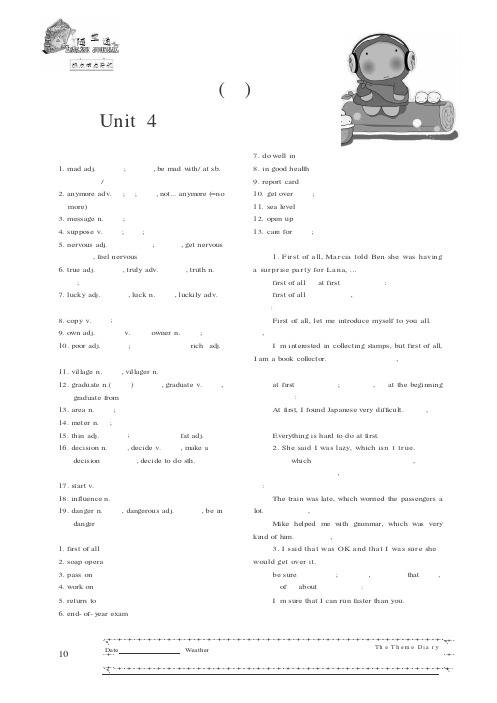
【单词识记】1.mad adj.疯狂的;狂热的,be mad w ith/at sb.对某人生气/发火2.anymore adv.再;还;今后,not...anymore (=no more)不再3.message n.消息;信息4.suppose v.假定;认为;期望5.nervous adj.神经紧张的;不安的,get nervous 变得紧张,f eel nervous 觉得紧张6.true adj.真实的,truly adv.真实地,truth n.事实;真相7.lucky adj.幸运的,luck n.运气,luckily adv.幸运地8.copy v.复制;抄袭9.own adj.自己的v.拥有owner n.物主;所有者10.poor adj.贫穷的;贫困的【反义词】rich adj.富有的11.village n.村庄,villager n.村民12.graduate n.(大学)毕业生,graduate v.毕业,gr aduate f rom 从……毕业13.area n.地区;地域14.meter n.米;公尺15.thin adj.稀薄的;瘦的【反义词】fat adj.胖的16.decision n.决定,decide v.决定,make adecision 下定决心,decide to do sth.决定做某事17.start v.开始18.inf luence n.影响19.danger n.危险,dangerous adj.危险的,be indang er 处于危险中【短语小结】1.first of all 首先2.soap opera 肥皂剧3.pass on 传递4.work on 从事于5.return to 返回到……6.end-of-y ear exam 期末考试7.do well in 在……方面做得好8.in good health 身体健康9.report card 成绩单10.get over 克服;恢复11.sea level 海平面12.open up 打开13.car e for 照料;照顾【句子运用】1.F ir st of a ll,Ma r cia told Ben she was having a sur pr ise pa r ty for La na,...first of all 与at first 的用法区别:first of all 意为“首先”,含有一种“强调”的意味。
人教新目标八年级英语下册unit4知识点

⼈教新⽬标⼋年级英语下册unit4知识点Unit 4 Why don't you talk to your parents重点短语hang out闲逛, too many太多, get into a fight争吵,go to sleep去睡觉, call sb up给某⼈打电话 be good at擅长,talk about谈论, on the phone在电话中, have a fight打架,look through浏览, give back归还, be angry with sb⽣某⼈的⽓,big deal重要的事, thanks for因…⽽感谢, no problem没问题,work out成功的发展解决, get on with和睦相处, feel lonely感到孤独, sit down坐下. communicate with sb与某⼈交流, next time 下次,make friends交朋友, be worried about担忧, study for a test为考试⽽学习,be afraid of害怕, in front of在…前⾯, not anymore不再, play sports做运动, watch movies看电影, so much/many那么多,do homework做作业, have lessons上课, do chores做家务,cut out删除, a few⼏个少许, all kinds of各种各样的, compare with把…与…⽐较, join after- school activities参加课外活动,in one's opinion依…看, turn down调⼩, be good for对…有好处动词短语allow sb to do sth允许某⼈做某事, why don't you do sth你为什么不做某事呢, want to do sth想要做某事, find sb doing sth发现某⼈正在做某事,tell sb to do sth告诉某⼈要做某事, refuse to do sth拒绝做某事,let sb do sth让某⼈做某事, offer to do sth 主动提出做某事,mind sb doing介意⼲某事, not …until直到……才,want sb to do想让某⼈做某事, it's time for sth该做某事了,it's adj to do做某事是…的, keep on doing继续做某事,why do you think of…你认为…怎么样, what's wrong哪⼉不舒服.重点句⼦My parents don't allow me to hang out with my friend.I got into a fight with my best friend.What's wrongI'm not good at writing letters.I don't want to talk about it on the phone.I found my sister looking through my thingings yesterday.I guess you could tell her to say sorry.Although she's wrong it's not a big deal.My problem is that I can't get on well with my family.Relations between my parents have become difficult.I don't know if I should say anything to them about this.When they argue, it's like a big black cloud, hanging over our home.Although my elder brother is not very nice to me.Instead he watches whatever he wants until late at night.At home I feel lonely and nervous.If your parents are having problems you should offer to help.Maybe you could do more jobs around the house, so that they have more time for proper communication.Secondly , why don't you sit down and communicate with your brotherYou should explain that you don't mind him watching TV all the time.My cousin borrows my things without returning them.You left your homework at home.You're afraid of speaking in front of people.Your best friend, doesn't trust you anymore.The Taylors are a typical American family.Maybe I could cut out a few of their activities.I really want them to be successful.However the tired children don't get home until after 7:00 .They have a quick dinner,then it's time for homework.In some families, competition starts very young and continues until the kids get older. And they are always comparing them with other children.It's crazy.People shouldn't push their kids so hard.Doctor says too much pressure is not good for a child's development.Doctor Alice Green says all these activities can cause a lot of stress for children.重点sb to do sth允许某⼈做某事 allow sth允许某事allow doing sth 允许做某事 be allowed to do sth被允许做某事The doctor allowed him to take a short walk every day.I don't think she will allow it.We don't allow smoking in our house.We are not allowed to throw rubbish everywhere.into a fight with sb=Have a fight with sb.=fight with sb.和某⼈打架We can't get into a fight with each other at school.'s wrong=what's the matter询问某⼈有什么问题,有什么不顺⼼的事,询问某物出了什么⽑病What's wrongI left my bag on the bus.What's wrong with your fingerThere is something wrong with my bike.Your answer is wrong but hers is right.4.Be good at擅长⼲某事, be good for对…有益be good to对…好 be good with善于应付…的.He is good at more water is good for you.She is very good to her neighbors.He's very good with children.the phone⽤电话交谈, on the Internet 通过互联⽹ on the radio.通过收⾳机What did you say on the phoneHe is chatting on the Internet.6、Look through查看,浏览, look after照顾. Look at看着, look for寻找, look out of向…外看, look forward to doing.盼望⼲某事The through the passage quickly and answer the questions.guess +宾语从句(变否定句时,否定要前移)I guess that he's right.I don't guess that he is right.sorry /hello /thanks/ goodbye to sb.向某⼈抱歉/问候/感谢/道别。
新目标英语八年级下unit_4重点短语句型语法+配套试题(答案)
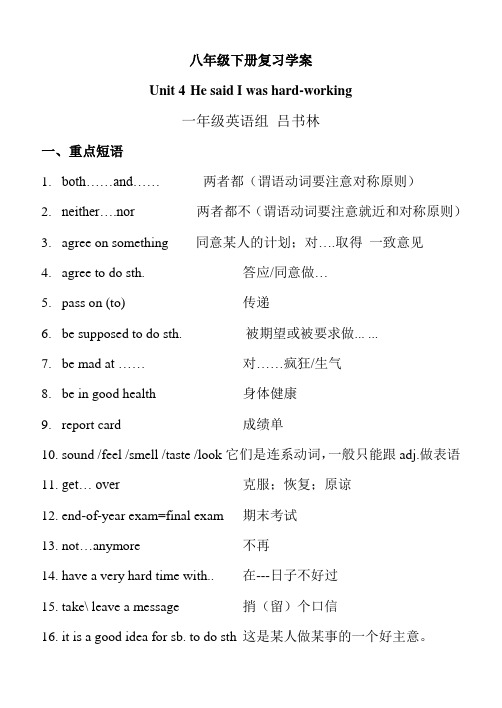
八年级下册复习学案Unit 4 He said I was hard-working一年级英语组吕书林一、重点短语1.both……and……两者都(谓语动词要注意对称原则)2.neither….nor 两者都不(谓语动词要注意就近和对称原则)3.agree on something 同意某人的计划;对….取得一致意见4.agree to do sth. 答应/同意做…5.pass on (to) 传递6.be supposed to do sth. 被期望或被要求做... ...7.be mad a t ……对……疯狂/生气8.be in good health 身体健康9.report card 成绩单10.sound /feel /smell /taste /look它们是连系动词,一般只能跟adj.做表语11.get… over 克服;恢复;原谅12.end-of-year exam=final exam 期末考试13.not…anymore 不再14.have a very hard time with.. 在---日子不好过15.take\ leave a message 捎(留)个口信16.it is a good idea for sb. to do sth 这是某人做某事的一个好主意。
17.there is no difference between…and..在…和…之间没有区别18.the Hope Project 希望工程本单元目标句型:1.转述他人话语:What did sb. say? He said I …She said she…They said…许老师告诉我徐梦蝶会说二种语言。
Mr. Xu told me that XuMengdie could speak three languages.许老师说地球绕着太阳转。
Mr. Xu said (that)the earth turns around the sun. 许老师告诉我他将去北京。
2020年春人教新目标英语八年级下册Unit4-5知识点总结

2020年春人教新目标英语八年级下册Unit 4 Why don’t you talk to your parents?1..用于提建议的句型有:What about doing sth ?=How about doing sth?(1). 同意对方的建议时,一般用:….怎么样?.Let’s do sth . 让我们一起做某事吧。
Shall we/I do sth? 我们做…好吗?had better do/not do sth 最好做/不做某事Will/Would you please do sth 请你做…好吗?Would you like to do sth? 你想去做某事吗?Would you mind doing sth?你介意做某事吗?Why don’t you do sth?= Why not do sth?为什么不呢?◆Good idea./ That’s good idea. 好主意◆OK/ All right./ Great 好/ 行/太好了◆Yes, please ./ I’d love t o 是的/ 我愿意◆I agree with you 我同意你的看法◆No problem 没问题◆Sure/ Of course/ Certainly 当然可以◆Yes, I think so 对,我也这样想(2).对对方的帮助或要求表示委婉谢绝时,一般用:◆I don’t think so 我认为不是这样◆Sorry, I can’t对不起,我不能◆I’d love to, but…◆I’m afraid…我愿意,但恐怕……2. allow doing sth 允许做某事allow sb. to do sth 允许某人做某事be allowed to do sth 被允许做某事allow与let的辨析:allow指“允许”,表示“默许,听任,不加阻止”,allow sb to do sth 允许某人做某事。
2019年八年级英语下册Unit4Whydon’tyoutalktoyourparents知识点总结(新版)人教新目标版

Unit 4 Why don’t you talk to your parents?一,Topic(话题):1、talk about problems 谈论问题communication problems(交际问题):1)From family:Parents: don’t allow you to hang out with your friends, fight a lot, push you too hard (父母不允许你和朋友闲逛,父母经常吵架,管你太严)Sister or brother: look through your things, borrow your things without asking, not nice to you,(兄弟姐妹随便拿你的)东西,翻你的东西,对你不友好等)2)From school: have too much homework and too many after-school classes, have to compete with your classmates, have a fight with your best friend1、Give advice 给出建议(给建议的方法)1)should 应该,应当,提出建议,表示义务和职责As a student, you should study hard.You shouldn’t be late for class.2)could 可以,表示委婉客气地提建议You could ask me for help.You couldn’t shout at your parents.3)Why don’t you(they ,we) +do=Why not +do(动词原形)为什么不,提建议Why don’t you talk to your parents? = Why not talk to your parents?其他提意见的句型(了解)What\how about +doing sth?做某事怎么样?Shall we +do sth 让我们做某事好吗?Let’s +do sth 让我们做某事吧Would you mind +doing sth 你介意做某事吗?You had better (not) +do sth 你最好(不)做某事You’d better not be late for class.二、知识点(重点)P251、too much, much too, too many的区别1)too much太多,修饰不可数名称或动词(修饰动词时放在后面);too many太多,修饰可数名词复数。
人教新目标英语八年级下册unit4单元知识讲解
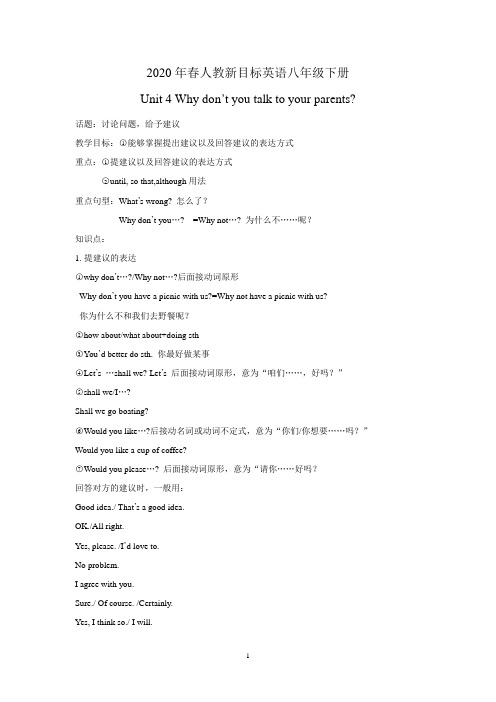
2020年春人教新目标英语八年级下册Unit 4 Why don’t you talk to your parents? 话题:讨论问题,给予建议教学目标:○1能够掌握提出建议以及回答建议的表达方式重点:○1提建议以及回答建议的表达方式○2until, so that,although用法重点句型:What’s wrong? 怎么了?Why don’t you…? =Why not…? 为什么不……呢?知识点:1.提建议的表达○1why don’t…?/Why not…?后面接动词原形Why don’t you have a picnic with us?=Why not have a picnic with us?你为什么不和我们去野餐呢?○2how about/what about+doing sth○3You’d better do sth. 你最好做某事○4Let’s …shall we? Let’s 后面接动词原形,意为“咱们……,好吗?”○5shall we/I…?Shall we go boating?○6Would you like…?后接动名词或动词不定式,意为“你们/你想要……吗?”Would you like a cup of coffee?○7Would you please…? 后面接动词原形,意为“请你……好吗?回答对方的建议时,一般用:Good idea./ That’s a good idea.OK./All right.Yes, please. /I’d love to.No problem.I agree with you.Sure./ Of course. /Certainly.Yes, I think so./ I will.表示拒绝时,一般用:I don’t think so./ Sorry, I can’t. /Sorry, but…I’d love to/ like to, but…/I’m afraid…2.until○1作介词“直到……为止”The meeting may last until Friday.○2作连词,直到……为止,在……以前,不到……a.用于肯定句中Heat can be conducted from a hot body to a cooler one until both are at the same temperature.热量可以从一个热的物体传到一个较冷的物体,直到两者温度相同为止。
2020年春人教新目标英语八年级下册Unit-4第1-2课时知识点总结

2020年春人教新目标英语八年级下册Unit 4 Why don’t you talk to your parents?第一课时1. You look tired. 你看起来疲劳。
系动词look看起来, turn变得, get成为, taste尝起来, sound听起来, become变成, keep保持, feel感觉到,look young看起来年轻;turn green变成了绿色;get longer变得更长了;taste good尝起来好吃;sound fun听起来有趣;become stronger变得更强壮了;keep quiet 保持安静;feel/be healthy 感觉很健康2. until 直到not …until …直到…才…你应该一直等到直到为考试学习的最后一分钟。
You should n’t wait until the last minute to study for a test. 你不该一直等到考试学习前的最后一分钟。
However, the tired children didn’t I didn’t sleep until 9 o’clock last night. 然而,这些疲劳的孩子们直到晚上九点才睡着。
get enough sleep 得到足够的睡眠3. forget to do sth./forget doing sth. 忘记去做某事/忘记做过某事;leave sth. +地点; 把某物忘在/落在某处;把你的作业忘在家里了leave your homework at homealthough引导让步状语从句,不与but, however连用。
Although she's wrong, it is not a big deal.尽管她做的不对,但也没什么了不起的。
big deal重要的事情或状况4. Hope things work out. 希望事情会好起来。
初中英语新目标八年级(下册)Unit 4 知识清单

重点单词:1.提建议的句式:Why don’t you +动词原形?=Why not +动词原形?= How about+动词ing?2.too much +不可数名词too many +可数名词复数太多.....much too+形容词/副词=very +形容词/副词3.I don’t get enough sleep.我得不到充足的睡眠enough 放在形容词后面,名词前面old enough 年纪足够大4.have free time to do sth 有空闲时间做某事5.allow v.允许,准许allow sth. 允许某事的发生allow doing sth. 允许做某事allow sb. sth. 给予某人某物(尤指钱或时间) allow sb. to do sth. 允许某人做某事6.hang out with sb 和某人闲逛hang over 笼罩7.get into a fight(n.) with sb 和某人打架fight v.打架fight with sb8.call sb. up 打电话给某人9.surprise(v.) sb. 令某人惊讶sth is surprising 某事令人惊讶sb is surprised with sth 某人对某事感到很惊讶to one's surprise(名词),令某人惊讶的是,10.be angry with sb. 生某人的气11.look through 浏览,快速查阅look up 查阅向上看look at... 看着......12.deal n. 协议;交易v. 解决deal with 处理not a big deal 没什么大不了make a deal 做交易13.so that+完整的句子因此;in order to do sth 为了......14.work out 顺利解决15.get on with= get along with sb相处愉快get on well/badly with sth. 进展顺利/不好get on 上车get off 下车16.refuse to do sth 拒绝做某事17.instead是副词,后面不接其他的词,放在句首或句末。
版新目标八年级下册英语unit4-why-don't-you-talk-to-your-parents重点知识讲解
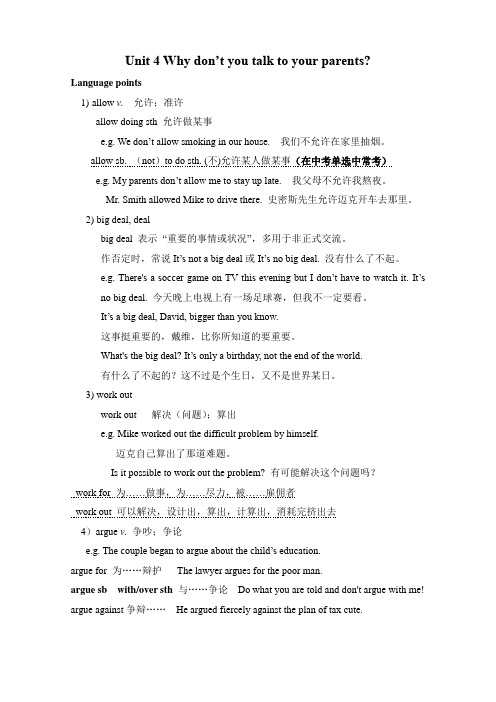
Unit 4 Why don’t you talk to your parents?Language points1)allow v. 允许;准许allow doing sth 允许做某事e.g. We don’t allow smoking in our house. 我们不允许在家里抽烟。
allow sb. (not)to do sth. (不)允许某人做某事(在中考单选中常考)e.g. My parents don’t allow me to stay up late.我父母不允许我熬夜。
Mr. Smith allowed Mike to drive there. 史密斯先生允许迈克开车去那里。
2) big deal, dealbig deal 表示“重要的事情或状况”,多用于非正式交流。
作否定时,常说It’s not a big deal或It’s no big deal.没有什么了不起。
e.g. There's a soccer game on TV this evening but I don’t have to watch it.It’sno big deal. 今天晚上电视上有一场足球赛,但我不一定要看。
It’s a big deal, David, bigger than you know.这事挺重要的,戴维,比你所知道的要重要。
What's the big deal? It’s only a birthday, not the end of the world.有什么了不起的?这不过是个生日,又不是世界某日。
3) work outwork out 解决(问题);算出e.g. Mike worked out the difficult problem by himself.迈克自己算出了那道难题。
Is it possible to work out the problem? 有可能解决这个问题吗?work for 为……做事,为……尽力,被……雇佣者work out 可以解决,设计出,算出,计算出,消耗完挤出去4)argue v. 争吵;争论e.g. The couple began to argue about the child’s ed ucation.argue for 为……辩护The lawyer argues for the poor man.argue sb with/over sth 与……争论Do what you are told and don't argue with me! argue against争辩……He argued fiercely against the plan of tax cute.5). proper adj.正确的;恰当的e.g. It’s not proper to visit a friend too late in the evening.太晚了,去看朋友不合适。
新版新目标八年级英语Unit4短语归纳
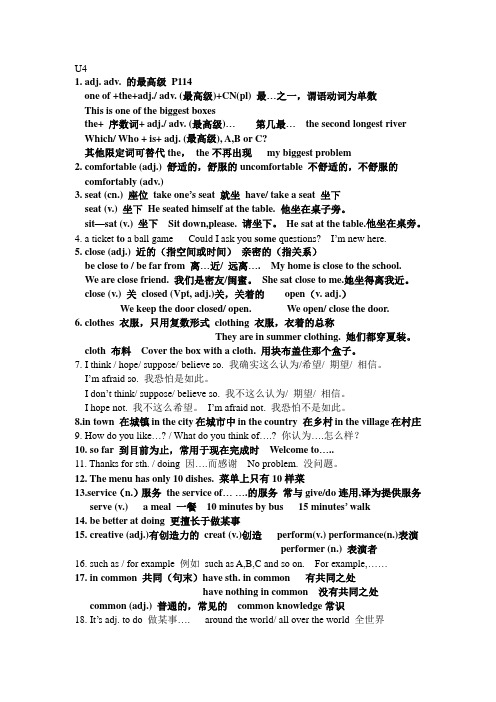
U41. adj. adv. 的最高级P114one of +the+adj./ adv. (最高级)+CN(pl) 最…之一,谓语动词为单数This is one of the biggest boxesthe+ 序数词+ adj./ adv. (最高级)…第几最…the second longest river Which/ Who + is+ adj. (最高级), A,B or C?其他限定词可替代the,the不再出现my biggest problem2. comfortable (adj.) 舒适的,舒服的uncomfortable 不舒适的,不舒服的comfortably (adv.)3. seat (cn.) 座位take one’s seat 就坐have/ take a seat 坐下seat (v.) 坐下He seated himself at the table. 他坐在桌子旁。
sit—sat (v.) 坐下Sit down,please. 请坐下。
He sat at the table.他坐在桌旁。
4. a ticket to a ball game Could I ask you some questions? I’m new here.5. close (adj.) 近的(指空间或时间)亲密的(指关系)be close to / be far from 离…近/ 远离…. My home is close to the school.We are close friend. 我们是密友/闺蜜。
She sat close to me.她坐得离我近。
close (v.) 关closed (Vpt, adj.)关,关着的open(v. adj.)We keep the door closed/ open. We open/ close the door.6. clothes 衣服,只用复数形式clothing 衣服,衣着的总称They are in summer clothing. 她们都穿夏装。
- 1、下载文档前请自行甄别文档内容的完整性,平台不提供额外的编辑、内容补充、找答案等附加服务。
- 2、"仅部分预览"的文档,不可在线预览部分如存在完整性等问题,可反馈申请退款(可完整预览的文档不适用该条件!)。
- 3、如文档侵犯您的权益,请联系客服反馈,我们会尽快为您处理(人工客服工作时间:9:00-18:30)。
Unit 4 Why don’t you talk to your parents?Section A1. Why don't you do sth. ?= Why not do sth.? 为什么不......呢?提建议的句型(1) What about doing sth. ?=How about doing sth.? ….怎么样?(2) Why don’t you do sth.?= Why not do sth.? 为什么不呢?(3) Let’s do sth. 让我们一起做某事吧。
(4) Shall we/I do sth.? 我们做…好吗?(5) had better do/not do sth. 最好做/不做某事(6) Will/Would you please do sth. 请你做…好吗?(7) Would you like to do sth.? 你想去做某事吗?(8) Would you mind doing sth.?你介意做某事吗?【回答】(1). 同意对方的建议时,一般用Good idea. / That’s good idea. 好主意OK/ All right. / Great. 好/ 行/太好了Yes, please. / I’d love to. 是的/ 我愿意I agree with you. 我同意你的看法No problem. 没问题Sure./ Of course./ Certainly. 当然可以Yes, I think so. 对,我也这样想(2).对对方的帮助或要求表示委婉谢绝时,一般用:I don’t think so. 我认为不是这样S orry, I can’t. 对不起,我不能I’d love to, but…我愿意,但恐怕…… I’m afraid… 恐怕……2.(1)too many + 复数名词许多too many people(2)too much +不可数名词许多too much homework(3)much too +形容词太… much too cold3. so conj. 因此(表示因果关系,后面跟表示结果的句子,不与because同时使用)4.allow v. 允许;准许(1) allow doing sth 允许做某事We don’t allow smoking in our house. 我们不允许在家里抽烟。
(2)allow sb.(not)to do sth. (不)允许某人做某事My parents don’t allow me to stay up late. 我父母不允许我熬夜。
Mr. Smith allowed Mike to drive there. 史密斯先生允许迈克开车去那里。
(3)be allowed to do sth. 被允许做某事(4)allow与let的辨析:allow指允许,表示默许,听任,不加阻止let 指让,let sb. do sth.让某人做某事,语意较弱,多用于口语中,let不能用于被动语态。
5.What’s wrong( with sb../ sth.) (某人/物)怎么了?6.go to sleep 去睡觉(强调“入睡,睡着”这一动作)fall asleep睡觉(强调“入睡,睡着”这一状态)7.look 看起来(系动词,后跟形容词作宾语)系动词:后跟adj.作表语一是:(be)am /is /are be quiet=keep quiet 保持安静二保持:stay/keep (表示持续状态)stay healthy=keep healthy 保持健康三变化:become/get/turn (表示状态变化)五起来:sound/look/smell/taste/feel (表示感觉)8. call up (v + adv) call on 拜访;号召9. find sb.. doing sth. 发现某人正在做某事Mr. Wang found Li Dong reading a storybook in the class.类似动词:hear,watch, see, feel10.look through 浏览翻阅仔细看look for 寻找look after=take care of照看look like看起来像look the same看起来一样look over检查,复习look through温习,检查look out小心,从里向外看look up向上看,查单词look around环视look forward to期望11.angry adj.生气的→ angrily adv. 生气地(1)be angry with sb.. =be mad at sb.. 对某人生气【with后接人】(2)be angry at/about sth.对某事感到生气【at后接事】(3)be angry to do sth. 做某事感到生气My father was very __________(对……生气)his computer.He hit the computer _______(angry)12.although= though 尽管, 用来引导让步状语从句。
though / although 不能与but连用although/however辨析(1)although conj 虽然;即使;纵然,引导让步状语从句时放在主句前后都可。
Although he is very old, yet he is quite strong.他虽然年纪大了,但身体还很健壮。
(2) however adv 然而尽管如此插入语,起连词作用,一般用逗号与句子分开,可放在句首或句中It’s raining hard, however, I think we should go out. 雨下的很大,尽管如此,我认为我们还应该出去。
13.big deal 表示重要的事情或状况,多用于非正式交流。
否定: It’s not a big deal=It’s no big deal.没有什么了不起; 没什么大不了;不是什么大事(常用于口语中)It’s a big deal. 这事挺重要的。
What's the big deal? 有什么了不起的?14..hope v 希望(1)hope to do sth. I hope to visit Guilin.(2) hope + that 从句(表示希望)I hope that you’ll be better soon(3)wish v 希望wish to do sth. I wish to visit Guilin.wish sb..to do sth. 希望某人做某事I wish you to go.wish +that 从句表示愿望,从句用虚拟语气I wish I were you.15.work out 解决;成功地发展,后跟fine,well, badly等词,表明产生的结果如何。
(1)计算出(答案、数量、价格等)The math problem is too difficult for me to work out(2)制定出(计划等),设计出I have worked out a new way of doing it.(3)解决;找出…的答案The government has many problems to work out.(4)work for 为……做事,为……尽力,被……雇佣者16. get on with sb. =get along with sb. 和某人和睦相处;和某人关系良好get on well/ badly with 相处的好/坏get on=get along 进展,进步How are you getting on these days? 你近来生活如何?17.argue v 争吵→argument n 争论have an argument with sb..与某人辩论(1)argue with sb与某人争吵argue with sb about /over sth. 为某事与某人争吵(2)argue about sth. 争论某事(3)argue against 争辩;反对He argued against the plan(4) argue for 为……辩护The lawyer argues for the poor man.18. hang over 挂在......之上;悬浮在......之上(1)hang out 闲逛;常去某处He likes reading and he often hangs out in the bookshop.(2) hang on to 紧紧抓住You’d better hang on to me in the crowd.(3) hang up 挂电话;悬挂After she finished her conversation19.elder/older elder adj.年纪较长的His elder brother is ill.(1)elder 表示兄弟姐妹及子女之间的长幼关系,表示“前辈的”、“年纪较长的”,仅用于同一家庭成员的比较;older则不限于此。
older泛指新旧、老幼或年龄的大小关系,是old的比较级形式。
My younger son is five and my elder son is nine。
我的小儿子5岁,大儿子9岁。
Tom is two years older than I.汤姆比我年长两岁。
(2)elder在句中只用作定语,不作表语;older两者皆可。
My elder sister does her homework all by herself. 我的姐姐独自做作业。
His elder son got married last week. 他的长子是上星期结婚的。
I think his mother is older. 我认为他的母亲年龄大引起。
(3)elder只能用来指人;older既可修饰人,也可修饰物。
My elder brother joined the army when he was only fifteen.我哥年仅15就参了军。
This dog is older than any other dogs here.这条狗在这里是最老的一条。
I have a sister older than myself.我有位比我大的姐姐。
20.be nice to sb.. 对某人友好be friendly to sb.. be good to sb..21.refuse=say no to v拒绝refuse to do sth.拒绝去做某事22. instead 代替,反而,却(1) instead adv 代替,句首或句尾, 表示前面的事情没做,而做了后面的事情。
